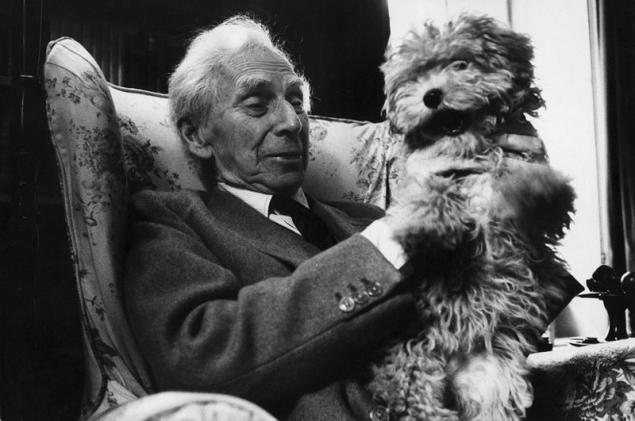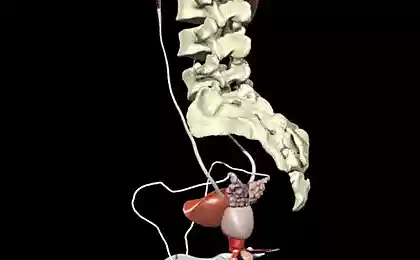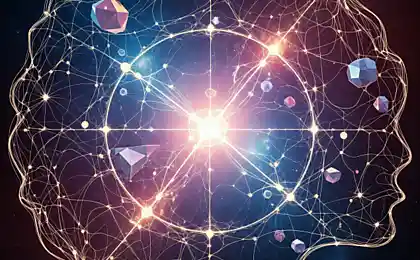639
Bertrand Russell: the older I get, the longer be periods of happiness
— Lord Russell, You seem like a very happy man. Were you always like that?
— No, of course not. I had periods of happiness and periods of unhappiness. To my delight, it seems that the older I get, the become longer periods of happiness.
— What was You worst, an unhappy period?
— I was very, very unhappy in my youth. I think, like many teenagers. I had no friends, nobody I could talk to. It seemed to me that I was thinking about suicide and I barely kept myself from doing, but in reality it was not true. Oh, of course, I imagined that I was very unhappy, but it was partially fiction, which I learned from dreams. In my dream I was really very sick and died.

Oddly enough, my bed was Professor Covet, master of Balliol College and the translator of Plato, an extremely learned man and friend of our family. He had a squeaky voice, and I in my dreams told him a very sentimental tone: "Well, in any case, there is one convenience: soon, I'll be away from it all." He asked: "You mean life?" And I answered: "Yes, I mean life." And he said, "If You were a little older. You would not say such stuff." I woke up and never talked such nonsense.
But when You were happy, that was consciously designed or happened by chance?
— It was a conscious plan only when it concerned my work, the rest of my life I relied on impulse and chance. But, of course, for the work I had a deliberate plan, which I did quite successfully.
— But do You think it works well — leave happiness to chance and impulse?
— Oh! I think to a great extent it depends on luck and how your work will be. I was terribly unhappy period (at a much later time than that when I was younger, I was talking about) when I was absolutely stumped on a problem I had to solve before to continue on my work. Two years I have struggled with this problem with absolutely no visible progress, and it was a very unhappy time.
— What do You think components of happiness?
— I think the most important four. Perhaps the first of them is health, the second — sufficient funds to keep you from want, the third — happiest personal relationships and the fourth is a successful work.
— Why health? Why are You making him so important?
— I think if you are very healthy, it's hard to really be happy. Illness affects the mind and makes you feel miserable. Certain disease you can endure stoically, but not all.
— What do You think, what you healthy, makes you happy or what you happy make you healthy?
— I think first of all that you healthy, makes you happy, but more helps too. I believe that happy people are less likely to get sick than unhappy.
— Tell me, You have a better day when in the morning You feel good night's sleep than when You sleep badly?
Oh, Yes, of course.
We can consider the following component of income? How important is it?
— It depends on the level of life to which you are accustomed.
If you used to be quite poor, you don't need a very large income. If you used to be very rich, you feel unhappy, if your income is just big, but not huge, so it's all a matter of habit, I suppose.
Not whether this will result, however, in obsessive pursuit of the money?
— Oh, very easy, and it often happens. You will find that the richest people are afraid to die in the workhouse. So often it happens.
— That is too much money does not necessarily bring happiness.
Yes. I think money is a kind of minimal condition, and you don't want to think about them too much. If you think about them too much, you start to worry.
— You've made a personal connection the third in the list. Did you mean that You consider them to be third in priority?
— No, no. From my experience, I have to say that they are the first necessity or it is the first need after health.
— Could You explain a little more what you mean?
Under personal relationships?
Yes.
— I guess that's obvious enough. It means friendship, love, communication with children, all kinds of intimacy, close personal relationships. If they don't bring happiness, it makes life quite difficult.
— Work. Now, how high would You rate the importance of a successful work?
— Is actually very high in the case with all energetic people. Some people are more apathetic and do not depend on work so much. But if you're energetic around, you should have an outlet for their energy and work is the obvious way.
Of course, the work will not make you happy, if it is not successful. But if it is successful, it fills your day and add you a lot of happiness.
— Does it matter what kind of job is this?
— No, I don't think that matters, unless it is a dubious work. I believe that if I were a member of the Politburo, the work would have been a little hectic, but...
— It could be an incentive for someone who likes that sort of thing.
— Yes, if you like it, then everything will be fine.
But the insignificance or great importance of what you are doing is important?
— No, it depends on your temperament. Some people can be happy only when they are involved in great things, while others can be quite happy with small achievements. It is a question of temperament. But your work should be such that your abilities have allowed you to perform it successfully.
— What You say seems to presume that someone would be happy to be lazy, that someone would be very happy if the work was not enough?
— Yes, but you wouldn't be so happy, at least from my experience. The joy is really good, successfully completed part of complex work is actually very, very big, and I don't think that the lazy man has ever experienced something similar.
— If You said that You would wait more fun, if You were less intelligent, how would you react?
Oh, I wouldn't go for it, no. In fact I would be willing to do far fewer pleasures, if I could get a little smarter. No, I love um!
— Do You think that philosophy contributes to happiness?
— It helps if you are interested in philosophy and well versed in it, but not bricklaying... if you are a good bricklayer.
All you good, bring happiness.
— What are the factors that hinder happiness?
There were a sufficient number, in addition to those that are the opposites of those things of which we have spoken. One of the factors that impeded the achievement of happiness is anxiety, and in this respect I was much happier over the years, I got older. I worry much less, and I developed a very useful tactic against worry, which is to think: "What's the worst thing that could happen?"... And then to think: "In the end, it wouldn't be so bad a hundred years later, it may not have mattered". After you really made yourself think that you don't have to worry so much. Anxiety is due to the fact that you have avoided to face unpleasant possibilities.
— You are able to eliminate anxiety?
— Not completely, no, but to a very large extent.
— And where would You set up envy?
— Oh Yes, envy. It's a terrible source of unhappiness for many people. I remember the painter Haydon, who was not a very good artist, but I would like to be. He kept a diary and in it he recorded: "Spent the morning miserable, comparing himself to Raphael".
— Could You develop this question is about envy?
— I think a huge number of people with a lot of what can make them happy, worried, because they think that someone else has a little more.
They think that someone has a better car or a better garden, or about how nice it would be to live in a better climate, or how much greater recognition brings one or the other work and things like that. Instead of rejoicing that they have a reason to be happy, they refuse pleasure, thinking that perhaps someone else has more, and it is irrelevant.
— Yes, but could jealousy be a good thing in the sense that if you envy someone's work because you think she might be better than yours, this may be an incentive for you to do your own work better?
Yeah, maybe, but it also serves as incentive to do the worst job, I think, especially when trying to relate other people's work. There are two ways to be ahead of another person: one to outdo himself, and to come forward and the other pulled him back.
— Boredom... boredom is As important, in Your opinion?
— I think it is extremely important, and I'm not going to say that it is typical only to humans, as I watched the monkeys in the zoo, and it seemed to me that they miss you too, but I don't think that other animals miss. I think it shows higher intelligence, and its importance is quite large.
You can see this from the fact that the savages, when they first come into contact with civilized people, most want alcohol. They want it much more than the Bible, or the gospel, or even blue beads, and they want it because at the time he takes away the boredom.
— How to overcome the boredom of people, for example girls who are pretty well educated? They marry and they have nothing to do but to look after the house.
Is a bad social system. I don't think you can change her individual actions, but given Your example is very important. It shows that we have no need of the social system, because everyone should have the opportunity to develop any useful ability, whatever he or she may possess. Modern, highly educated women once they are married, do not have this capability, but it is a consequence of our social system.
— How the understanding of the motives of his actions, helps a person to be happy and thus to avoid self-deception?
I think this help a big. All people either hate someone or hate some group, or something else, under the impression that the basis of their motives lies a noble idealism. When in fact it's probably not so. If they could realize it, I think they'd be happier.
— Do you think that many people feel unhappy, deceiving ourselves?
— Yes, I think very, very many.
— Do You think you can be happy in misfortune, say, in jail? You yourself were there.
— I had a very good time in prison, but then I was in the first Department, which did not feel the usual pressures of prison life. But usually it's very, very difficult for a person accustomed to mental work. Much easier if you're used to physical labor, because you are not deprived to the same extent habitual intellectual life.
— You think it's easier to be happy, for example, in prison, in a situation in which You were when you thought You were in it for a good cause than if you were in it because they deserve it?
— Yes, of course. I mean what if they made me the same sentence for stealing spoons, I'd be pretty unhappy because I would feel... well... I would be deservedly disgraced. But in my situation I didn't feel dishonored.
Just because it was a matter of principle?
Yes.
— Do You think that helps people be happy that they have some kind of purpose for which they live?
— Yes, under this condition, they can more or less succeed. I think if it is a goal that is impossible to achieve, they will not be happy. But if they can succeed from time to time, then I think it helps. And I think that this principle should also be applied to other things, other interests, especially when you get older, a very important element of happiness. The more impersonal your interests extend beyond your own life, the less you will argue against the fact that your own life will come to an end only after quite a long time. I think that is a very important element of happiness in old age.
— What do You think about all these formulas that people keep telling me how to live a long life and be happy?
— Well, how to live a long life, it's a medical matter and not one in which I would like to comment. I get a huge amount of literature from the defenders of such systems. They tell me that as soon as I take the medication, my hair will be black again. I'm not sure I like it, because I found that the whiter my hair is, the more readily people believe in what I say.published
1959
P. S. And remember, just changing your mind — together we change the world! ©
Source: izbrannoe.com/news/mysli/bertran-rassel-chto-takoe-schaste-/
— No, of course not. I had periods of happiness and periods of unhappiness. To my delight, it seems that the older I get, the become longer periods of happiness.
— What was You worst, an unhappy period?
— I was very, very unhappy in my youth. I think, like many teenagers. I had no friends, nobody I could talk to. It seemed to me that I was thinking about suicide and I barely kept myself from doing, but in reality it was not true. Oh, of course, I imagined that I was very unhappy, but it was partially fiction, which I learned from dreams. In my dream I was really very sick and died.

Oddly enough, my bed was Professor Covet, master of Balliol College and the translator of Plato, an extremely learned man and friend of our family. He had a squeaky voice, and I in my dreams told him a very sentimental tone: "Well, in any case, there is one convenience: soon, I'll be away from it all." He asked: "You mean life?" And I answered: "Yes, I mean life." And he said, "If You were a little older. You would not say such stuff." I woke up and never talked such nonsense.
But when You were happy, that was consciously designed or happened by chance?
— It was a conscious plan only when it concerned my work, the rest of my life I relied on impulse and chance. But, of course, for the work I had a deliberate plan, which I did quite successfully.
— But do You think it works well — leave happiness to chance and impulse?
— Oh! I think to a great extent it depends on luck and how your work will be. I was terribly unhappy period (at a much later time than that when I was younger, I was talking about) when I was absolutely stumped on a problem I had to solve before to continue on my work. Two years I have struggled with this problem with absolutely no visible progress, and it was a very unhappy time.
— What do You think components of happiness?
— I think the most important four. Perhaps the first of them is health, the second — sufficient funds to keep you from want, the third — happiest personal relationships and the fourth is a successful work.
— Why health? Why are You making him so important?
— I think if you are very healthy, it's hard to really be happy. Illness affects the mind and makes you feel miserable. Certain disease you can endure stoically, but not all.
— What do You think, what you healthy, makes you happy or what you happy make you healthy?
— I think first of all that you healthy, makes you happy, but more helps too. I believe that happy people are less likely to get sick than unhappy.
— Tell me, You have a better day when in the morning You feel good night's sleep than when You sleep badly?
Oh, Yes, of course.
We can consider the following component of income? How important is it?
— It depends on the level of life to which you are accustomed.
If you used to be quite poor, you don't need a very large income. If you used to be very rich, you feel unhappy, if your income is just big, but not huge, so it's all a matter of habit, I suppose.
Not whether this will result, however, in obsessive pursuit of the money?
— Oh, very easy, and it often happens. You will find that the richest people are afraid to die in the workhouse. So often it happens.
— That is too much money does not necessarily bring happiness.
Yes. I think money is a kind of minimal condition, and you don't want to think about them too much. If you think about them too much, you start to worry.
— You've made a personal connection the third in the list. Did you mean that You consider them to be third in priority?
— No, no. From my experience, I have to say that they are the first necessity or it is the first need after health.
— Could You explain a little more what you mean?
Under personal relationships?
Yes.
— I guess that's obvious enough. It means friendship, love, communication with children, all kinds of intimacy, close personal relationships. If they don't bring happiness, it makes life quite difficult.
— Work. Now, how high would You rate the importance of a successful work?
— Is actually very high in the case with all energetic people. Some people are more apathetic and do not depend on work so much. But if you're energetic around, you should have an outlet for their energy and work is the obvious way.
Of course, the work will not make you happy, if it is not successful. But if it is successful, it fills your day and add you a lot of happiness.
— Does it matter what kind of job is this?
— No, I don't think that matters, unless it is a dubious work. I believe that if I were a member of the Politburo, the work would have been a little hectic, but...
— It could be an incentive for someone who likes that sort of thing.
— Yes, if you like it, then everything will be fine.
But the insignificance or great importance of what you are doing is important?
— No, it depends on your temperament. Some people can be happy only when they are involved in great things, while others can be quite happy with small achievements. It is a question of temperament. But your work should be such that your abilities have allowed you to perform it successfully.
— What You say seems to presume that someone would be happy to be lazy, that someone would be very happy if the work was not enough?
— Yes, but you wouldn't be so happy, at least from my experience. The joy is really good, successfully completed part of complex work is actually very, very big, and I don't think that the lazy man has ever experienced something similar.
— If You said that You would wait more fun, if You were less intelligent, how would you react?
Oh, I wouldn't go for it, no. In fact I would be willing to do far fewer pleasures, if I could get a little smarter. No, I love um!
— Do You think that philosophy contributes to happiness?
— It helps if you are interested in philosophy and well versed in it, but not bricklaying... if you are a good bricklayer.
All you good, bring happiness.
— What are the factors that hinder happiness?
There were a sufficient number, in addition to those that are the opposites of those things of which we have spoken. One of the factors that impeded the achievement of happiness is anxiety, and in this respect I was much happier over the years, I got older. I worry much less, and I developed a very useful tactic against worry, which is to think: "What's the worst thing that could happen?"... And then to think: "In the end, it wouldn't be so bad a hundred years later, it may not have mattered". After you really made yourself think that you don't have to worry so much. Anxiety is due to the fact that you have avoided to face unpleasant possibilities.
— You are able to eliminate anxiety?
— Not completely, no, but to a very large extent.
— And where would You set up envy?
— Oh Yes, envy. It's a terrible source of unhappiness for many people. I remember the painter Haydon, who was not a very good artist, but I would like to be. He kept a diary and in it he recorded: "Spent the morning miserable, comparing himself to Raphael".
— Could You develop this question is about envy?
— I think a huge number of people with a lot of what can make them happy, worried, because they think that someone else has a little more.
They think that someone has a better car or a better garden, or about how nice it would be to live in a better climate, or how much greater recognition brings one or the other work and things like that. Instead of rejoicing that they have a reason to be happy, they refuse pleasure, thinking that perhaps someone else has more, and it is irrelevant.
— Yes, but could jealousy be a good thing in the sense that if you envy someone's work because you think she might be better than yours, this may be an incentive for you to do your own work better?
Yeah, maybe, but it also serves as incentive to do the worst job, I think, especially when trying to relate other people's work. There are two ways to be ahead of another person: one to outdo himself, and to come forward and the other pulled him back.
— Boredom... boredom is As important, in Your opinion?
— I think it is extremely important, and I'm not going to say that it is typical only to humans, as I watched the monkeys in the zoo, and it seemed to me that they miss you too, but I don't think that other animals miss. I think it shows higher intelligence, and its importance is quite large.
You can see this from the fact that the savages, when they first come into contact with civilized people, most want alcohol. They want it much more than the Bible, or the gospel, or even blue beads, and they want it because at the time he takes away the boredom.
— How to overcome the boredom of people, for example girls who are pretty well educated? They marry and they have nothing to do but to look after the house.
Is a bad social system. I don't think you can change her individual actions, but given Your example is very important. It shows that we have no need of the social system, because everyone should have the opportunity to develop any useful ability, whatever he or she may possess. Modern, highly educated women once they are married, do not have this capability, but it is a consequence of our social system.
— How the understanding of the motives of his actions, helps a person to be happy and thus to avoid self-deception?
I think this help a big. All people either hate someone or hate some group, or something else, under the impression that the basis of their motives lies a noble idealism. When in fact it's probably not so. If they could realize it, I think they'd be happier.
— Do you think that many people feel unhappy, deceiving ourselves?
— Yes, I think very, very many.
— Do You think you can be happy in misfortune, say, in jail? You yourself were there.
— I had a very good time in prison, but then I was in the first Department, which did not feel the usual pressures of prison life. But usually it's very, very difficult for a person accustomed to mental work. Much easier if you're used to physical labor, because you are not deprived to the same extent habitual intellectual life.
— You think it's easier to be happy, for example, in prison, in a situation in which You were when you thought You were in it for a good cause than if you were in it because they deserve it?
— Yes, of course. I mean what if they made me the same sentence for stealing spoons, I'd be pretty unhappy because I would feel... well... I would be deservedly disgraced. But in my situation I didn't feel dishonored.
Just because it was a matter of principle?
Yes.
— Do You think that helps people be happy that they have some kind of purpose for which they live?
— Yes, under this condition, they can more or less succeed. I think if it is a goal that is impossible to achieve, they will not be happy. But if they can succeed from time to time, then I think it helps. And I think that this principle should also be applied to other things, other interests, especially when you get older, a very important element of happiness. The more impersonal your interests extend beyond your own life, the less you will argue against the fact that your own life will come to an end only after quite a long time. I think that is a very important element of happiness in old age.
— What do You think about all these formulas that people keep telling me how to live a long life and be happy?
— Well, how to live a long life, it's a medical matter and not one in which I would like to comment. I get a huge amount of literature from the defenders of such systems. They tell me that as soon as I take the medication, my hair will be black again. I'm not sure I like it, because I found that the whiter my hair is, the more readily people believe in what I say.published
1959
P. S. And remember, just changing your mind — together we change the world! ©
Source: izbrannoe.com/news/mysli/bertran-rassel-chto-takoe-schaste-/
The first and tenth day of the tourist resort
Marietta Chudakova: People do not realize what year awaits us























